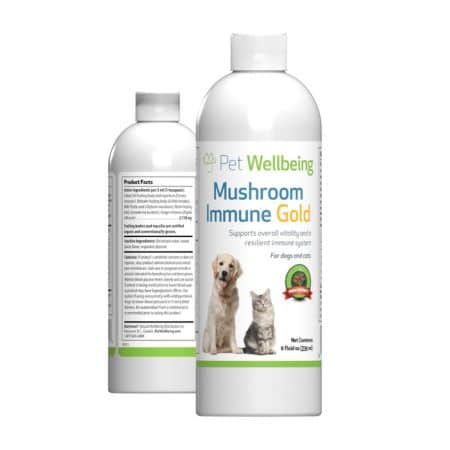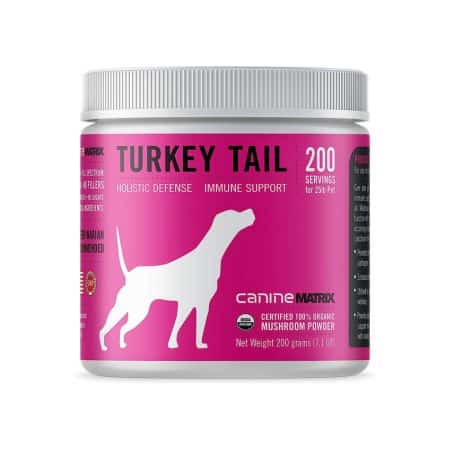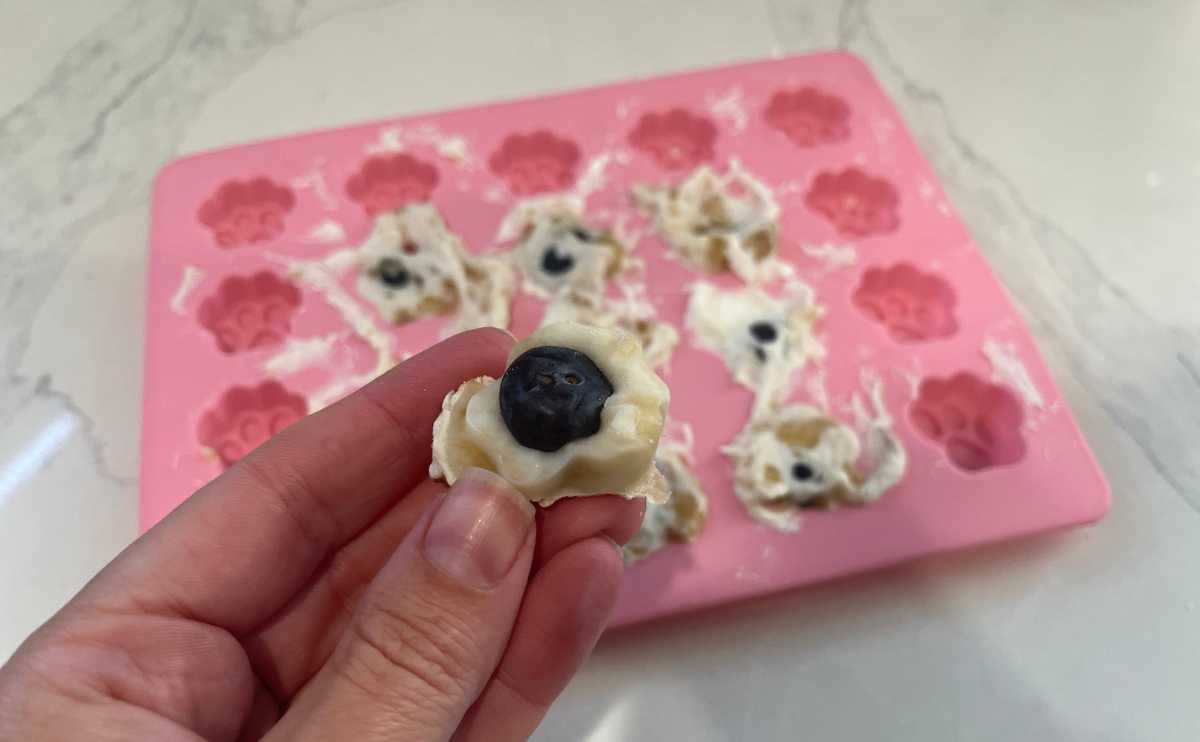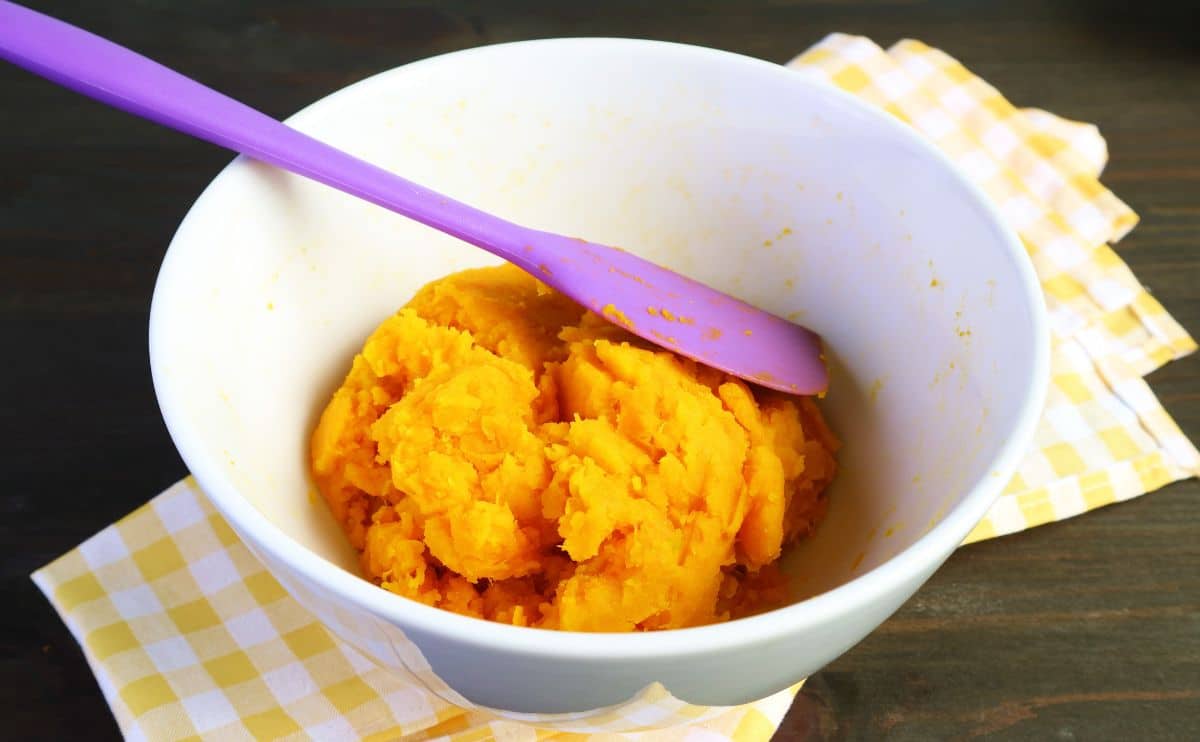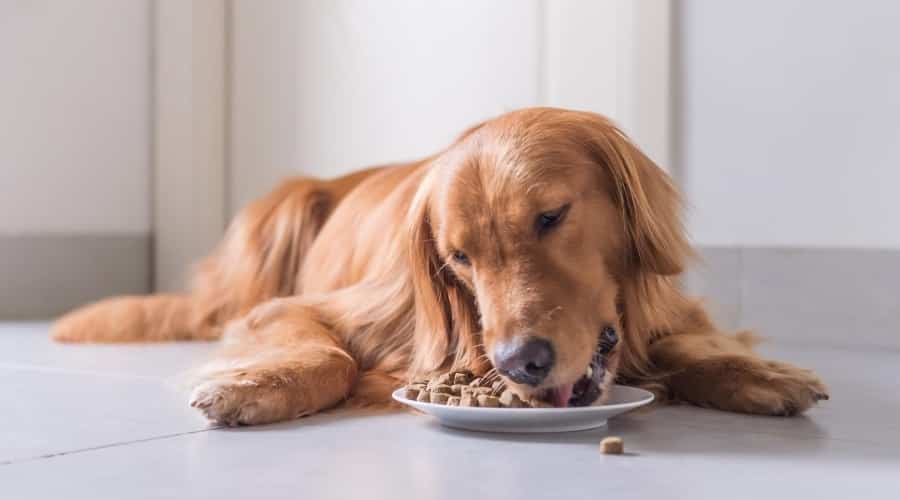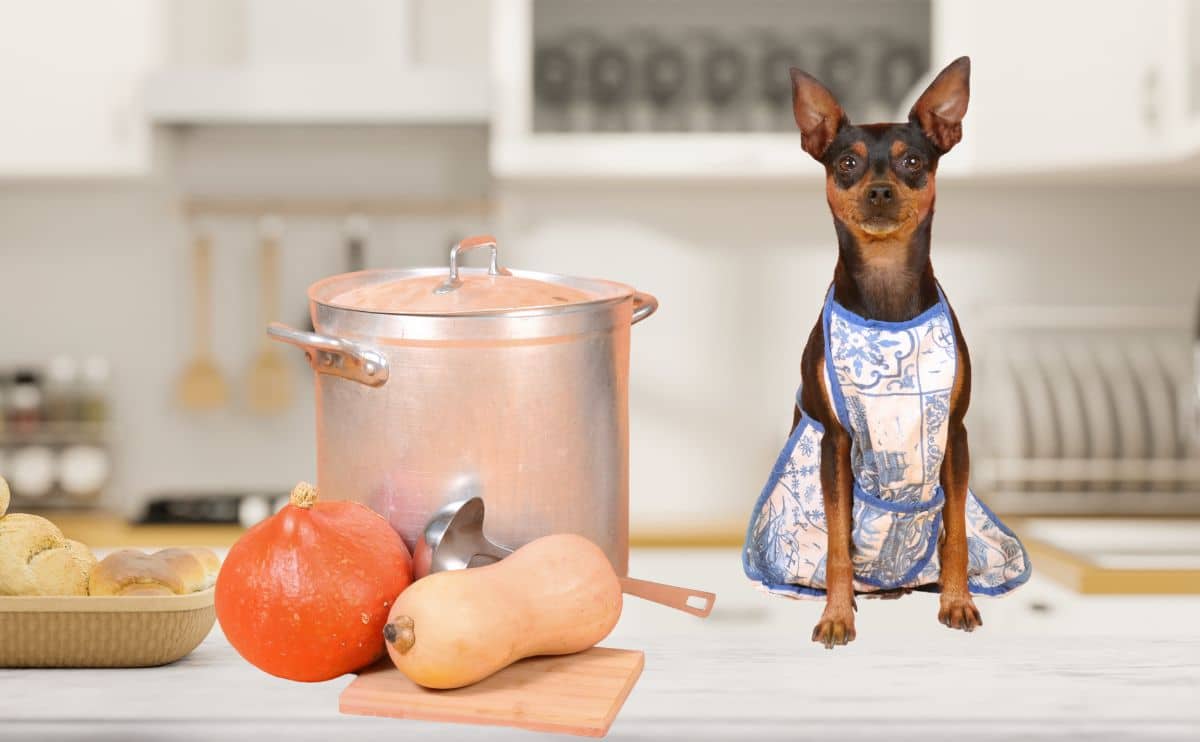Can Dogs Eat Mushrooms? Which Ones Are Safe, Poisonous & Toxic, Supplements & More
When you purchase through links on our site, we may earn a commission. Here’s how it works.

When out on walks, sometimes my dog sees a mushroom growing which looks tempting to eat. But it got me wondering: are mushrooms okay for dogs? What if your dog nibbles on a mushroom or eats one at the dinner table? Is that safe? And when are mushrooms dangerous for dogs? I give you the lowdown on all kinds of safe and unsafe mushrooms and explain what to do if your dog eats a toxic one.
Table of Contents
Can You Give Dogs Mushrooms?
First off, can dogs have mushrooms? The answer is it depends. It’s okay to give your dog a small piece of certain kinds here or there, but don’t get in the habit of feeding mushrooms to your pup regularly. That said, there are a few ways dogs can get ahold of this funky fungi. You may accidentally drop a few pieces of raw mushrooms while cooking, which eagerly get gobbled up (it happens to me all the time). Even in urban areas like mine, your dog can get into a wild mushroom in the yard. Is either of these situations safe? Each situation is unique, given what kind of mushroom your dog ate and other factors like your pup’s health.
Are Dogs Allergic To Mushrooms?
If your dog is sick after eating a mushroom, he might have a mushroom allergy. An at-home allergy test can help you identify any mushroom sensitivities or intolerances.
What The Vet Says About Dogs Eating Mushrooms
To learn more, I asked veterinarian Rebecca MacMillan about dogs eating mushrooms.
Just as with people, some mushrooms are safe for dogs to eat, and some are definitely not! Supermarket ones that we would consume are okay for dogs if they are fed plain, unseasoned, and in moderation. However, wild mushrooms must always be avoided. There are so many varieties of wild mushrooms, and it can be hard to identify the safe ones from the deadly ones unless you are an expert. Therefore, it is safest not to encourage your dog to eat any mushrooms at all while out on a walk.
– Dr. Rebecca MacMillan, BVetMed, BSAVA, PGCertSAM, MRCVS, a companion animal veterinarian in Gloucester, United Kingdom
I also asked Dr. MacMillan what to do if your dog eats a wild mushroom. Here’s what she said, “If your dog accidentally snacks on a wild mushroom, then you should immediately remove them from the area to stop them from eating more. Call your vet straight away to let them know what has happened. It might be useful to take a photo or a sample of any remaining mushrooms in case it is possible to identify the type involved.”
Dr. MacMillan continues, “If your dog has only recently consumed the mushroom, your vet might suggest inducing vomiting. This will remove the offending material before your dog has time to digest it, reducing the risk of severe toxicity. In some cases, flushing the stomach out under anesthetic may be required. Any further treatment is aimed at treating the symptoms that mushroom poisoning could cause. Affected animals may need to be on intravenous fluids (a drip) and receive anti-nausea or anti-seizure medications. Sadly, in some cases, mushroom ingestion can be fatal, causing irreversible organ damage, especially if immediate treatment isn’t sought. It is better to be safe than sorry, so seek urgent help if your dog has eaten a wild mushroom.”
What Mushrooms Are Safe For Dogs?
Can dogs eat mushrooms from the grocery store? Typically yes. Here are the common types of mushrooms available for human consumption and details on whether they are okay for dogs. And remember, like any new food, it’s essential to introduce a dog slowly, not to upset their stomach.
Can Dogs Eat White Mushrooms?
Plain, white button mushrooms are also known as crimini mushrooms and are perfectly safe in small quantities if they are clean and chemical-free. If possible, buy organic, and don’t season them with any sauces or spices, especially onion or garlic. Stay away from canned mushrooms that are full of preservatives and other additives.
Can Dogs Eat Portabella Mushrooms?

Yes, raw, cooked, or steamed portabellas (a more mature type of crimini mushroom) are perfectly safe if they are plain, washed, and free of other toxic chemicals or ingredients.
Can Dogs Eat Baby Bella Mushrooms?
Baby Bella mushrooms, another crimini mushroom, are similar to white and portabella mushrooms. Raw and cooked Baby Bellas are fine for dogs as long as they are not sautéed in heavy cream, garlic, onions, or sauce.
Can Dogs Eat Shiitake Mushrooms?
Unseasoned shiitake mushrooms are safe for dogs to eat. They’re common in Asian cuisines, so avoid giving your dog salty or garlic-filled sauces and spices.
Can Dogs Eat Cooked Mushrooms?

Dogs can eat both cooked and raw mushrooms. They are safe as long as they are on the list of safe mushrooms above and your dog is not allergic to them. Your pup may like the taste and texture of both cooked and raw mushrooms.
Can Dogs Eat Mushrooms On Pizza?
It doesn’t hurt if a mushroom falls off your pizza onto the floor, as long as it’s on the safe mushrooms list and not covered in other common pizza ingredients like onion, garlic, or other toxic food that could cause concern.
What Mushrooms Are Poisonous To Dogs?
Just because your dog can eat certain types of store-bought, washed mushrooms doesn’t mean all mushrooms are safe. In fact, some mushrooms are toxic to dogs, possibly contributing to liver or kidney damage. Veterinarians and mushroom experts believe that mushroom toxicity often goes unreported and is a common cause of dog fatalities. Dogs and some kinds of mushrooms can be a deadly combination.
What Mushrooms Are Toxic To Dogs?
In addition to commercially grown mushrooms, you might wonder, “Are lawn mushrooms poisonous to dogs?” These species below are very toxic, if not fatal:
- Amanita phalloides (death cap)
- Galerina marginata (deadly Galerina)
- Amanita gemmata (jeweled death cap)
- Amanita muscaria (fly agaric)
- Gyromitra species (false morel)
- Inocybe species and Clitocybe dealbata mushrooms
Pet insurance covers unexpected vet visits, such as accidental poisoning, if your dog has an active policy. You can learn more about your insurer options in our pet insurance comparison.
Are Wild Mushrooms Bad For Dogs?
Mushroom varieties, particularly those that grow in the wild, can be difficult to identify. Toxic mushrooms can be challenging for dogs to identify as well. For that reason, it’s best to remove them from your yard and avoid them on walks.
Symptoms Of Mushroom Poisoning In Dogs
Every toxic mushroom produces different poisoning symptoms, and each dog can have a different reaction to them. Some potential symptoms that your dog ate a mushroom and is experiencing food poisoning include:
- Gastrointestinal issues, including diarrhea and vomiting
- Increased saliva, eye-watering, and urination
- Neurological reactions, like seizures or acting drunk
Learn more about the symptoms of poisoning in dogs.
What If My Dog Ate A Mushroom In The Grass?
If your dog ate a mushroom in the yard, you should call your vet immediately. Can’t reach your vet? Contact the Pet Poison Helpline at 1-855-764-7661 or use our “Ask A Vet” feature to chat with a veterinary professional and get help 24 hours a day, seven days a week.
If you go to your vet, take a sample of the mushroom your dog ate, if possible. Wrap it in a wet paper towel inside a paper or plastic bag to keep it fresh. This might help your vet identify what type of mushroom he ate and determine the best treatment.
A recent study by the Norwegian Institute of Public Health found that with rapid treatment and early identification of mushroom type ingested, dogs have a higher rate of survival. This further backs up the importance of getting your pup rapid treatment if you suspect ingestion of a poisonous mushroom.
Should I Induce Vomiting If My Dog Ate A Mushroom?
If the ingestion was recent and the mushroom is still in your dog’s system, your vet may suggest or induce vomiting. In other instances, they may give your dog medication to help absorb and counterbalance the toxins. Either way, keeping your pet comfortable and managing symptoms is a priority for his health and well-being.
Other Types Of Mushrooms For Dogs
Let’s discuss a few additional mushroom situations to determine if they are okay for dogs.
Dog Stinkhorn Mushroom
Mutinus caninus is a type of fungus that has the nickname “dog stinkhorn” or “stinkhorn” because it’s shaped like a dog’s phallus and smells like dead animals. While stinkhorns might smell foul, they should not cause serious harm to pets or humans. However, your dog could still get sick if they ingest dog stinkhorn. So, if you come across them, watch closely for symptoms.
Can Dogs Eat Mushroom Soup?
A small amount of mushroom soup shouldn’t hurt, but it’s not a good food to give to dogs regularly, if at all. Mushroom soups are typically loaded with cream or dairy, which can cause stomach issues in dogs, especially those with lactose intolerance. In addition, cream of mushroom soup is high in salt and contains garlic, both of which can prove harmful to dogs.
Medicinal Mushrooms & Mushroom Supplements For Dogs
Some mushrooms can have a medicinal effect and improve a dog’s immune system and cellular health. They also contain antioxidants and digestive enzymes, supporting vital organs and promoting long-term health. However, studies are limited, and evidence is not conclusive enough to say how much impact they have or if there are any potential risks or side effects.
Are you looking for the best mushroom supplements for dogs? Medicinal mushrooms come in the form of liquid, capsules, powder, or chewable tablets. Talk to your vet, and if they recommend using a mushroom supplement, then there are several types to consider and ways to administer it to your dog.
The dosage amount will depend on your dog’s health needs and other circumstances like breed, age, and more.
It’s not advised to give your dog magic mushrooms or shrooms.
Reishi Mushroom For Dogs
Both dogs and humans may benefit from the medicinal properties of reishi mushrooms (Ganoderma lucidum). When given as an anti-inflammatory supplement, there are several health benefits, primarily for reducing allergies and boosting immunity. Reishi mushrooms contain ganoderic acid, which reduces the release of histamines that cause allergic reactions. Reishi mushrooms may also support liver and kidney functions and provide benefits for blood sugar and blood pressure concerns.
Reishi Mushroom Warnings
Reishi mushrooms promote blood thinning. So, if your dog has trouble clotting its blood, do not administer this item. It’s also not advised to give to dogs that are nursing or pregnant. As with all supplements and medications, speak to your vet before beginning treatment.
Turkey Tail Mushroom For Dogs
Turkey tail mushrooms get their name because they are shaped like a turkey’s feathery tail. Its scientific name is Trametes versicolor or Coriolus versicolor, and it is known in the medical world to have some benefits. It contains beta-glucans that can fight off diseases and also works as a probiotic to assist gut health.
It can be especially useful to boost the immune system of dogs undergoing chemotherapy and cancer treatment. There are several over-the-counter turkey tail products available, and it comes as a powder, pill, or liquid. Please speak with your vet before giving your dog turkey tail mushrooms.
Dog Eats Mushrooms And Dies (Video)
Sadly, dogs eating unsafe mushrooms can quickly lead to death. Watch this news story about a Boston Terrier puppy who had a tragic end after eating mushrooms while on a walk outside an apartment complex.
What Other Foods Can Dogs Eat?
Wondering what other foods you can give your dog? Find out which foods are and aren’t safe for dogs to eat and drink and what to do if your dog has an upset stomach.
Keeping Your Pup Safe Outside
Keeping your dog away from hazards like wild mushrooms, chemicals, and toxic plants is an ongoing challenge. The danger can be in your own yard, something your pup encounters out on a walk, or even at the dog park. Proper leash training and plenty of supervision when out on walks and at play are essential parts of keeping your pup safe.
Why Trust Canine Journal?
Sadie Cornelius is a pet parent to a Cavalier King Charles spaniel who loves to eat human food. As a foodie herself, she cooks often and is keenly aware of what dogs can and can not eat and extra cautious so as not to let toxic foods fall on the ground when preparing or enjoying meals. She also lives in DC, where the fungus is prone to growing when it rains a lot. So she has to ensure that her pup doesn’t try to eat wild mushrooms while out on walks with him.
